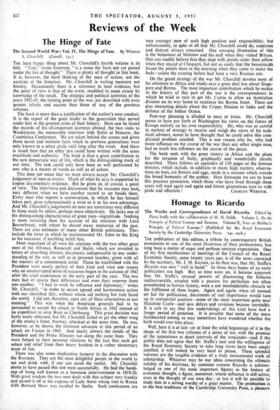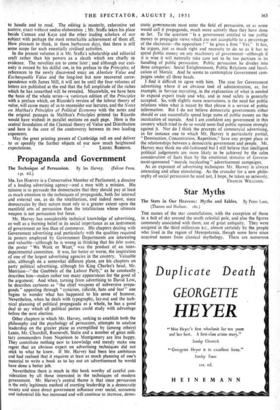Homage to Ricardo
The Works and Correspondence of David Ricardo. Edited by Piero Sraffa with the collaboration of M. H. Dobb. Volume I, On the Principles of Political Economy and Taxation. Volume II, Notes on Makhus's Principles of Political Economy.* (Published for the Royal Economic Society by the Cambridge University Press. 245. each.) THE publication of this edition, a tribute by contemporary British economists to one of the most illustrious of their predecessors, has long been a matter of eager and perhaps anxious expectation. One of my first recollections of 'meetings of the Council of the Royal Economic Society, some twenty years ago, is of the news conveyed by the secretary, Mr. J. M. Keynes, as he then was, that Mr. Sraffa's Ricardo was now " well in hand." In those days hopes of an early publication ran high. But, as time wore on, it became apparent that Mr. Sraffa's unusual powers of discovering the hitherto undiscoverable, coupled with a passion for perfection not often precedented in human history, were a not inconsiderable obstacle to the fulfilment of these hopes. Again and again, when all seemed set fair for publication, documents of real importance would turn up in unexpected quarters—some of the most important quite near Malahide Castle—and new delays and revisions bedame inevitable. It is safe to say that few undertakings of this kind have had a longer period of gestation. ,It is possible that some of the more fainthearted among us may Sometimes have wondered whether the birth would ever take place. Well, here it is at last—or at least the solid beginnings of it in the shape of the first two voflimes of a series of ten, with the promise of the appearance at short intervals of the remainder—and if the public does not agree that Mr. Sraffa's zeal and the willingness of the Royal Economic Society to take long views have been amply justified, it will indeed be very hard to please. These splendid' volumes are the tangible evidence of a truly monumental work of scholarship. Whatever may be our ideas concerning the ultimate validity of his doctrines, by common consent Ricardo is acknow- ledged as one of the most important figures in the history of economic thought, a figure, moreover, whose influence is still active, even in the thought of our own day ; at last it will be possible to study him in a setting worthy of a great master. The production is in the best traditions of the Cambridge University Press, a pleasure to handle and to read. The editing Is masterly, exhaustive yet austere, exact without undue elaboration ; Mr.-Sraffa takes his place beside Cannan and Kaye and the other leading scholars of our subject with perhaps the most remarkable achievement of them all. How pleasant to think, in these barbarous days, that there is still some scope for such essentially civilised activities.
In the present volumes it is Mr. Sraffa's scholarship and editorial craft rather than his powers as a sleuth which are chiefly in evidence. The novelties are to come later ; and although our curi- osity is roused by his skilful use, in his preface to the Principles, of references to the newly discovered essay on Absolute Value and Exchangeable Value and the long-lost but now recovered corre- spondence with James Mill, it will not be until the four volumes of letters are published at the end that the full amplitude of the riches which he has unearthed will be revealed. Meanwhile, we have here the basis of the whole series—a variorum edition of the Principles with a preface which, on Ricardo's version of the labour theory of value, will cause many of us to reconsider our lectures, and the Notes on Malthus's Principles of Political Economy with the notes and the original passages in Malthus's Principles printed (as Ricardo would have wished) in parallel sections on each page. Here is the central foundation of the Classical theory of Value and Distribution and here is the core of the controversy between its two leading exponents.
May the great printing presses of Cambridge roll on and deliver to us speedily the further objects of our now much heightened































 Previous page
Previous page